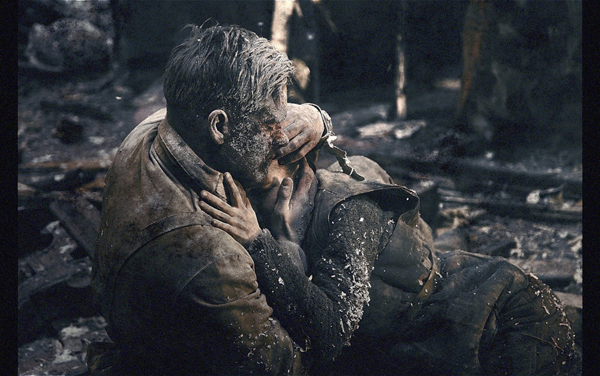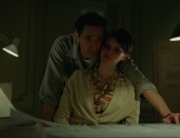The sheer scale of the Battle of Stalingrad—six months long, two million dead—is the kind of thing Americans can struggle to understand. It belongs firmly to the epic grandeur of Old World wars. Stalingrad is the closest modern equivalent to the battles of antiquity, a place where outsized acts of heroism on a world-historical scale were not only possible, but expected and needed.
Impossible to depict in its entirety, the massive scale of the battle is depicted here in a few scenes, like a long sequence where a Nazi officer ignites a fuel tank to rain napalm on Russian soldiers charging up the hill. The 3-D IMAX images of burning soldiers refusing to quit are both uncompromisingly violent and somewhat reverently beautiful. As unbelievable as this sequence is, it actually happened. People are capable of amazing things when the fate of the world depends on their courage.
Mostly the filmmakers focus on a resilient group of Russian soldiers creating a makeshift home in a strategically important apartment building. They emerge outside on occasion to beat back Nazi advances. The basic contradiction of the battle is handled deftly through this truly epic, history altering conflict played out in the claustrophobic confines of urban warfare. The core of the film is the contrasting attempts by Soviets and Nazis to dwell in this hellish space.
The Soviet group consists of five soldiers led by the hard-as-nails Captain Gromov (Petr Fedorov), who encounters Katya (Mariya Smolnikova), a young woman living alone in a wrecked apartment building that is the one thing standing between the Nazis and control of the Volga River. The five soldiers hunker down and hold the Nazis off for weeks, during which time we get to know them quite well. There’s Chvanov (Dmitry Lisenkov), a merciless sniper whose family was slaughtered by the Nazis. Lisenkov’s performance is perhaps the most striking, as he really brings out the insanity and rage that going to war brings out of people, but also how it can be controlled and used against the enemy. Also of note is Nikiforov (Aleksey Barabash), a silent lethal Nazi killing machine reminiscent of Inglorious Basterd’s Hugo Stiglitz, but with a richer backstory and more memorable scenes.
Each soldier falls for Katya in different ways as she becomes a reminder of what life could hold beyond the present hellish circumstances. She gives them a reason to not completely lose their humanity as they try to maintain some decorum and cheerfulness for her benefit. They all have moments of bonding with Katya and to show off a special soldiering ability.
We also spend significant time with Nazi Captain Kahn (Thomas Kretschmann), who likewise tries to forge a livable space in the Stalingrad rubble. A young Russian woman, Masha (Yanina Studilina), has the misfortune of looking like Kahn’s dead wife, so he keeps her in his room as a kind of reminder of his happy past life. Their relationship evolves, and though he mistreats her throughout, he tries to be as good to her as the conditions allow, and she develops some fondness for him. Kahn spends much of the time being berated by Colonel Heinz (the beyond perfectly cast Heiner Lauterbach) for his inability to capture the apartment building, and we see what an impossible situation he’s in, and even empathize with him as much as it’s possible to for a Nazi. The film benefits greatly from showing the toll the battle took on both the heroic Soviets and the evil Nazis.
The Battle of Stalingrad has an interesting place in history, being only a few generations removed from us, but still unimaginably far from today’s experience. The problematic position of this mythical battle is addressed in the frame story bookending the battle. The film opens with a catastrophe in present-day Russia as Sergey, a rescue worker and son of a soldier depicted in the film, tells his father’s story to a trapped woman. It concludes with the woman overwhelmed by the beauty of the story and Sergey a bit melancholically reflecting that he will never approach those heights of heroism. Sergey seems haunted by the knowledge that his life cannot be as dramatic and iconic as his father’s because the stage is so much less grand. Stalingrad is a tour of that grand stage totally devoid of mythology, propaganda, or easy pathos.







Leave A Comment